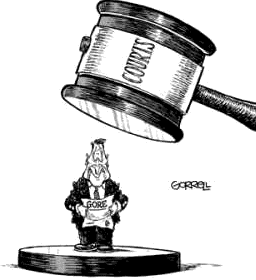
Tony Snow
served a purpose
http://www.jewishworldreview.com -- AL GORE has forced Americans to confront the most important political and philosophical question of the era: How shall we define "rule of law"?
Two schools of thought contend for supremacy. Under one -- let's call it the Simple Theory -- the law means what it says. It employs simple words to govern public behavior, knowing that people are more likely to support and obey laws they understand than ones they don't. By this standard, when it comes to statutory verbiage, less is more
The theory presupposes a society filled with mature adults who have an obligation to take care of themselves without reliance on lawyers and regulators. It envisions a world that assigns an important role to custom and trust -- a place where businessmen shake on deals, one's word is one's bond and people resolve petty disputes face-to-face.
The Simple School assumes that right and wrong exist not merely as abstract concepts, but as identifiable moral facts. It acknowledges that simple rules are easy to grasp and hard to follow. (Consider the Ten Commandments and the Golden Rule.) It regards citizens as the ultimate guardians of social order.
A competing theory -- call it the Complex Theory -- has taken hold in recent years. It claims that law changes with the slow march of history. It accommodates our shifting fads and fancies, forcing legislators to draft statutes in response to our evanescent concerns and needs. If a problem arises, pass a bill.
.
 |
Our tax code provides a perfect example. It contains thousands of codicils and appendices, most of which address very specific needs. Some sentences, for instance, are written to help individual constituents, especially those who have donated generously to the statute's drafters. The result is legal literature of unparalleled vastness and inscrutability.
Several years ago, I had dinner with a man who previously had run the Tax Division at the U.S. Department of the Treasury. He had agonized for months over a provision that had some bearing on his tax returns. He wanted to follow the law, but try as he might, he couldn't make heads or tails of it. He called his old colleagues at Treasury. They were baffled. So was the Internal Revenue Service. Evidently, nobody in America knew what the passage meant.
His experience demonstrated an important axiom: Complex laws are impossible to comprehend and easy to evade. The more "nuanced" they are, the bigger and more numerous their loopholes.
Loopholes abound because the Complex Theory also contends that language has no fixed meaning. Bill Clinton expressed this conviction when he told a judge, "It depends what the meaning of the word 'is' is."
The Florida Supreme Court adopted this approach when it berated Florida Secretary of State Katherine Harris for "hyper-technical reliance upon statutory provisions" when interpreting state law. The court then rewrote Florida's election code -- with the full expectation that state officials would implement the change with "hyper-technical" precision.
This leads us to the crucial distinction between our two approaches to law. The Simple Theory relies on trust and responsibility. The Complex Theory inclines toward distrust and litigation.
Think of what happens when a society regards its citizens with suspicion. The government treats everybody as a suspect, and casts about for ways to prevent misbehavior. Mistrust breeds and justifies coercion. And mistrust erupts when people no longer can agree on such basics as right and wrong, and the meaning of common words. Legal simplicity, in contrast, invites consensus and depends on it.
This insight brings us full circle. The Gore-Bush battle is a Complex-Simple dispute. Gore has relied consistently on a Complex view of law. It inspired his promise to "fight" factions of the population he had identified as mean, venal or menacing. Since Election Day, he has invited courts to supplant legislatures. Why the courts? Because he says we can't trust anybody else.
In a Simple world, Gore would have followed convention and conceded -- despite his misgivings
about the outcome. In his Complex world, he seems determined to litigate until death, penury or
utter irrelevance. But one thing is for sure: If his view prevails, you can count on a society
where lawyers rule as kings -- and the rest of us will have to duck for
Comment on Tony Snow's column by clicking here.
